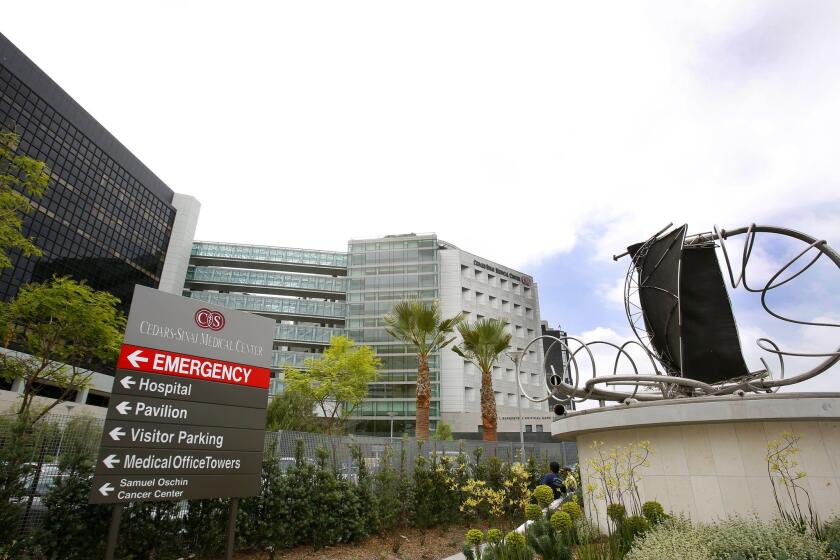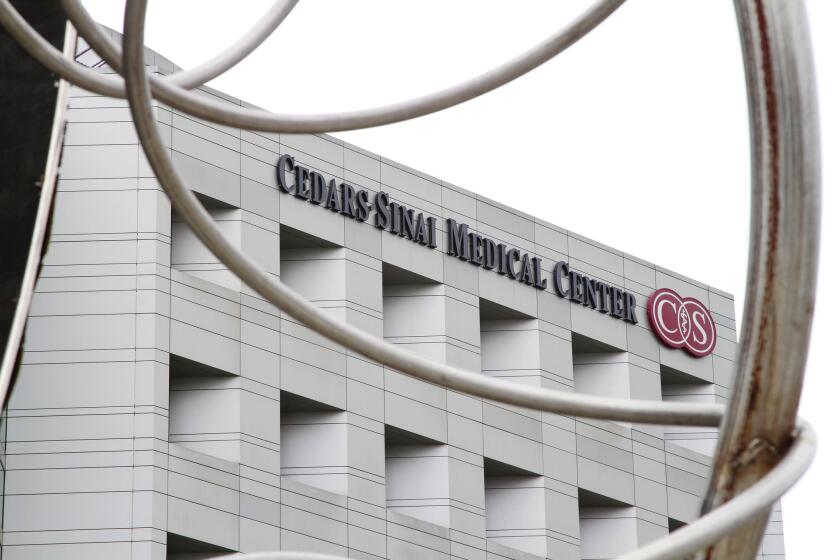Hospitals had to put charity care rules on their websites months ago. Some didn’t do it

- Share via
To help patients who are financially strapped, California lawmakers decided to stiffen state requirements for hospitals to offer free or discounted care.
AB 1020, which went into effect in January, makes more people eligible for discounted care, increasing the income levels under which hospitals are supposed to offer it to uninsured patients or those facing high costs. And it also added a simple requirement: Hospitals must prominently post their financial assistance policies on their websites.
“You should not have to have an attorney to get what the hospitals are required to give by law,” said Tracy Douglas, an attorney with Bet Tzedek who works on a medical-legal partnership team at Harbor-UCLA Medical Center. “That’s what AB 1020 aimed to fix.”
Yet more than nine months after the California law went into effect, some hospitals still had not put up their charity care policies in readily apparent spots on their websites, The Times found after reviewing websites for hospitals around the state. Several updated their pages or said they would do so after being contacted by The Times.
CHA Hollywood Presbyterian Medical Center, located in East Hollywood, said in October that it had a charity care policy as required by law, but “this policy is not on our public website.” When The Times pointed out that state law requires it to be prominently posted online, a hospital spokesperson promptly shared the policy and said it would be posted within days.
Natividad, a public hospital in Salinas, had a brief mention on the billing section of its website that it provides financial assistance, including charity care, but did not have a link to its policy as of late October.
Its chief financial officer, Daniel Leon, said it had been working to revise its policy and expected to have it on their website within 45 days. Leon said that patients were nonetheless being made aware of charity care and payment discounts in multiple ways, “including handouts upon admission, lobby signage, website signage and patient handbook information.”
Arrowhead Regional Medical Center in Colton added a link to its charity care policy to its website after being contacted by a Times reporter. Kern Medical also added a link to its charity care policy to its “Make a Payment” page sometime in recent weeks; screenshots from the Internet Archive show the link was not posted there as of late September.
Most hospitals must offer free or reduced-cost care, based on income, even if patients have insurance. But they don’t make it easy.
And Zuckerberg San Francisco General Hospital has a section of its website that encourages patients to reach out to financial counselors, but did not have its charity care policy posted there as of late October.
When The Times asked where to locate it, a ZSFG spokesperson provided a link to where it was posted on the California Department of Health Care Access and Information website — another requirement under AB 1020 — but acknowledged it was not yet on the hospital website as of mid-October. It recently added a link to access the policy on that page.
Bernadette Manigault, a senior attorney with Neighborhood Legal Services of Los Angeles County, said she was “surprised but not surprised” that some hospitals had not posted their charity care policies on their websites months after the law went into effect.
Before the new law was passed, hospitals were already required to “clearly and conspicuously” post notices about their financial assistance policies in “locations that are visible to the public,” including their billing offices, but legal aid groups had still encountered patients who were unaware.
It can be “incredibly difficult to find for the average consumer,” Manigault said. “They have these policies — but you have to really know how to get there.”
As of late October, The Times was also unable to locate a charity care policy on the websites for Southern California Hospitals at Culver City and Hollywood after checking its “billing” pages and searching the sites. Nearly three weeks after a reporter asked where they were posted online, after repeated requests, a spokesperson provided links to webpages about legal protections against surprise bills, which included a single link titled “Charity Care Policy” near the bottom. (It’s unclear when those links were first added; a Southern California Hospitals spokesperson did not respond to that question.) The hospital recently updated its billing pages to mention charity care policies more prominently.
The California Hospital Assn., which provided hospitals with a summary of the new rules, said it had not heard from regulators or from hospitals themselves about widespread problems with AB 1020 compliance. Its vice president for external affairs, Jan Emerson-Shea, said that when state regulators alerted hospitals to requirements under the new law last winter, health facilities were facing a surge in COVID cases and continuing to grapple with staff shortages.
Emerson-Shea said it was possible that “some of these things unfortunately were overlooked ... but I don’t think there’s any widespread issues in regards to hospitals not wanting to do it.”
Leon, the chief financial officer at Natividad, said the rules went into effect during the winter surge in COVID patients, and “our priority was to care for them.”
Liliana Viamari, the spokesperson for CHA Hollywood Presbyterian, said that its website had already been directing families in need of financial assistance to contact its family advocates, but the hospital had been hit hard with COVID at the beginning of the year and also had new financial staff starting at that time, “causing this detail of the requirement to be overlooked.”
“In no way are these excuses ... it should have been posted on our website,” Viamari said in an email. “We are happy that it was rectified.”
Helen Tran, senior attorney with the Western Center on Law and Poverty, said that if hospitals have not posted their charity care rules on their websites, “it does make me concerned about what’s going on inside the hospital” as well, since AB 1020 also requires changes in other hospital practices surrounding debt collection and discount eligibility.
“It’s the easiest of the requirements,” said Anthony Wright, executive director of Health Access California, a consumer advocacy coalition. “If they’re not doing that, then I worry about the other things.”
Cedars-Sinai loosened the income cap for patients to qualify for free or discounted care.
The Times also found that some hospitals had information on their websites that did not reflect the increased eligibility for discounted care under AB 1020. As of the beginning of November, Loma Linda University Medical Center stated on its website that patients making at or below 350% of the federal poverty level might be eligible for discount payments.
AB 1020 requires that patients be eligible for discounts if their income is at or below 400% of the federal threshold and they are also uninsured or have high medical costs.
A Loma Linda University Medical Center spokesperson did not answer questions about whether the document that had been posted online was its current policy, but said in a brief statement that it was in compliance with the state law, eligible patients were informed they could obtain financial assistance, and “website updates are in progress.”
Salinas Valley Memorial Healthcare System also stated, in a financial assistance policy posted on its website at the end of October, that patients could be eligible if their family income was less than 350% of the federal poverty level and they met other requirements. After being alerted to the issue by The Times, the hospital updated its link to a new policy with a 400% threshold, which a representative said had already been in use by its financial assistance counselors.
Besides increasing the eligibility for discounted care, AB 1020 also bars hospitals from selling off patient debt unless they have found that the indebted patients are not eligible for financial assistance or have not responded to attempts to bill them or offer assistance and requires patients to be sent applications for financial assistance before their bill is sent to collections.
Under the law, the California Department of Health Care Access and Information is supposed to review hospital policies to check whether they comply with the law by Jan. 1, 2023. Manigault said that the law won’t have “full teeth” until 2024, when that state department can start penalizing hospitals for violations.
Until then, complaints about hospitals failing to follow the law are still being fielded by the California Department of Public Health, which said it had no records of any hospitals it had investigated and found out of compliance. Tran said her organization had made complaints and that the agency had failed to back up its findings of no wrongdoing.
Assemblymember Laura Friedman (D-Glendale), who introduced AB 1020, said that “the fact that some hospitals are still failing to make basic information available to patients and the public is frustrating and reinforces the need for the more robust oversight outlined in AB 1020.”
The new law expands on the Hospital Fair Pricing Act passed by California lawmakers in 2006, which required hospitals to maintain written policies about charity care for qualified patients and set minimum requirements for who must be eligible to apply. One study published in Health Affairs found that between 2004 and 2012, the prices paid by uninsured patients had fallen substantially.
Yet legal assistance groups complained that in many cases, eligible patients were unaware they could access charity care.
A Kaiser Health News investigation three years ago found that across the country, nearly half of nonprofit hospital organizations were routinely sending medical bills to patients whose incomes were low enough to qualify them for charity care. The hospital data combed by Kaiser Health News included facilities in California.
In June, months after AB 1020 had gone into effect, California Atty. Gen. Rob Bonta issued a consumer alert and sent letters to hospitals after hearing complaints that hospitals were not following requirements to provide charity care policies in the language that patients understand.
A spokesperson said the office was unable to confirm or deny whether any investigation was underway in October, but “stands ready to enforce the law and use every tool we have at our disposal to make sure patients and their families do not have to suffer from needlessly high medical costs or be forced to choose between going to a doctor or being able to pay bills.”
More to Read
Sign up for Essential California
The most important California stories and recommendations in your inbox every morning.
You may occasionally receive promotional content from the Los Angeles Times.













